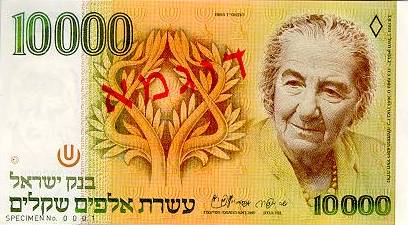
May 3
1469 Birth: Niccolo Machiavelli, philosopher, writer. "...The political genius of Niccolo Machiavelli was overshadowed by the reputation that was unfairly given to him because of a misunderstanding of his views on politics. Machiavelli's life was very interesting. He lived a nondescript childhood in Florence, and his main political experience in his youth was watching Savanarola from afar. Soon after Savanarola was executed, Machiavelli entered the Florentine government as a secretary. His position quickly rose, however, and was soon engaging in diplomatic missions. He met many of the important politicians of the day, such as the Pope and the King of France, but none had more impact on him than a prince of the Papal States, Cesare Borgia. Borgia was a cunning, cruel man, very much like the one portrayed in The Prince. Machiavelli did not truly like Borgia's policies, but he thought that with a ruler like Borgia the Florentines could unite Italy, which was Machiavelli's goal throughout his life. Unfortunately for Machiavelli, he was dismissed from office when the Medici came to rule Florence and the Republic was overthrown. The lack of a job forced him to switch to writing about politics..."
1494 Christopher Columbus first sights the island later to be named Jamaica, while in search of a westward route to the East.
1497 James Tutchet, Lord Audley, leads an army of 15,000 from Taunton through the southern counties to attack London.
1616 The Second Civil War in France ends with the signing of the Treaty of Loudun, granting an amnesty to the rebellious Prince of Conde.
1654 A bridge in Rowley, Massachusetts, begins charging a toll for animals, while people cross for free.
1747 War of Austrian Succession: The British roundly defeat the French at the first Battle of Cape Finisterre.
1765 The first US medical college opens in Philadelphia. Founded by John Morgan, the School of Medicine belongs to the College of Philadelphia (now the University of Pennsylvania). "The theory and practice of physick" and "anatomical lectures" are among the first subjects taught.

1791 King Stanislaw Augustus signs a liberal bill of rights, only the second written constitution in the world after that of the United States, reforming gentry-ruled Poland and setting up a constitutional monarchy. "...The opposition was split between Russian toadies and chauvinistic reactionaries. Neither could voice any coherent argument and both were taken aback by events. They were also unsettled by the ferment taking place in France, whose heady emanations could be felt in Poland. Debate on the question of reform had grown progressively more radical and the Seym had appointed a Commission to prepare a written constitution for the Polish Commonwealth. King Stanislaw Augustus, emerged from the isolation and started drawing up the new constitution. The ground for voting was prepared carefully, the allegiance of the Warsaw populace was assured, and date was chosen when many reactionary deputies were absent. 3 May 1791 the proposed constitution passed overwhelmingly and became the law. It was the first written constitution in Europe. The opening clauses were purposely anodyne. Catholicism was enshrined as the religion of the state, although every citizen was free to practice another without prejudice; the szlachta was declared to be the backbone of the nation; the peasantry was piously acknowledged as its lifeblood. The Seym became the chief legislative and executive power and voting was to be conducted by strict majority. The veto was abolished. The government of the country was vested in the King and a Royal Council. The king could direct policy, but nothing could leave his hands without the signature of at least one of the ministers, and the whole Council was answerable directly to the Seym. It was hardly revolutionary in itself; it was the commissions and other organs it set up which were to carry through the real reforms. The events in Poland were hailed all over the world..."
1814 Louis XVIII assumes the throne of France after Napolean's defeat and exile by the allies.
1815 The metronome is patented by John Laelzel.
1841 New Zealand is formally proclaimed a British colony.
1895 The territories owned by the British South Africa Company south of the Zambezi are given the name of Rhodesia.

1898 Birth: Golda Meir, Israeli prime minister. "Golda Meir was Foreign Minister and Prime Minister of Israel, one of the most visible women in international affairs from the 1950s to the 1970s. Born in Russia and raised in the United States, she settled in British Mandate Palestine with her husband (Morris Meyerson) in 1921. Meir (her adopted name) became active in Zionist politics, and after Israel's independence she served as the ambassador to the Soviet Union (1948), was elected to the Knesset (1949) and served as Foreign Minister (1956-65). After the death of Prime Minister Levi Eshkol, Meir became Prime Minister in 1969. Her attempts to garner peace for Israel were criticized after the Arab-Israeli War of 1973 (the Yom Kippur War), and she resigned in 1974, succeeded by Yitzhak Rabin."
1916 Irish nationalist Padraic Pearse and two others are executed by the British for their roles in the Easter Rising.
1921 West Virginia imposes the first state sales tax.

1933 The United States Mint gets its first woman director as Mrs. Nellie Ross assumes command.
1933 Holocaust: Sachsenburg (Sachsen) concentration camp goes into operation.
1934 Author and futurist H.G. Wells predicts there will be a major war by 1940. Note: See The Shape Of Things To Come.
1936 A fundraiser for Jewish refugees at Madison Square Garden draws 16,000 people.
1938 Holocaust: Flossenburg concentration camp opens in Germany.
1938 Holocaust: The DFG places 15,000 RM at the disposal of Dr. Ritter, "for the continuation of your research work on asocial individuals and on the biology of bastards (Gypsies, Jews)." (Science)

1938 Church and Reich: May 3-9 Hitler makes a state visit to Mussolini in Rome, but chooses not to make the customary "courtesy call" on the pope. (Lewy)
1939 Maxim Litvinov, a Jew and Soviet Foreign Minister for eighteen years, is replaced by Stalin with Vyacheslav M. Molotov, a gentile. Hitler is greatly pleased that Stalin seems to be removing the last Bolshevik Jews from positions of power, and correctly interprets the move as a shift away from the West. Note: Molotov will serve as Foreign Minister from 1939-49 and again from 1953-56. Litvinov will become Soviet Ambassador to the US 1941. (Ickes)

1939 Holocaust: Hungary enacts anti-Semitic laws similar to the Nuremberg Laws. Hungarian Jews are forbidden to become Judges, lawyers, schoolteachers, or members of Parliament. Those who converted to Christianity before 1919 and Jewish war veterans are exempted.

1942 WW2: The first modern naval engagement in history, the Battle of the Coral Sea begins. The United States, having broken Japan's secret war code and forewarned of an impending invasion of Tulagi and Port Moresby, attempts to intercept the Japanese armada. Four days of battles between Japanese and American aircraft carriers will result in 70 Japanese and 66 American warplanes destroyed. This confrontation marks the first air-naval battle in history, as none of the carriers fire at each other, allowing the planes taking off from their decks to do the battling. Among the casualties is the American carrier Lexington; "the Blue Ghost" (so-called because it was not camouflaged like other carriers) suffers such extensive aerial damage that it has to be scuttled by its own crew. Two hundred sixteen Lexington crewmen perish as a result of the Japanese aerial bombardment. Although Japan will go on to occupy all of the Solomon Islands, the cost in experienced pilots and aircraft carriers is so great that Japan will have to cancel its expedition to other South Pacific targets.

1943 WW2: The US government tries to discredit findings of the commission at Katyn to placate Stalin, who finds it difficult to believe that a government can't control it's own press. The US government tells Polish radio stations at home to "pipe down" about Katyn and Soviet crimes.
1944 WW2: US wartime rationing of most grades of meats ends.
1944 Dr. Robert Woodward and Dr. William Doering produce the first synthetic quinine at Harvard University.
1945 WW2: The British 14th Army captures Rangoon in Burma.
1945 WW2: German Admiral Doenitz, now the Second Fuehrer of the Third Reich, sends envoys to Lunenburg Heath to discuss possible surrender with Field Marshal Montgomery.
1945 WW2: Soviet forces have reached the Elbe River west of Berlin and make contact with the US First and Ninth Armies.
1945 WW2: The British XII Corps occupies Hamburg.

1945 WW2: Innsbruck, Austria, falls to the US Seventh Army, while other units advance on Salzburg.
1946 Nuremberg War Crimes Trials: Walther Funk testifies. (Maser II)
1948 The US Supreme Court rules that covenants prohibiting the sale of real estate to blacks or members of other racial groups are legally unenforceable.
1951 In Britain, King George VI and Queen Elizabeth inaugurate the Festival of Britain on a bomb site near Waterloo Station in London.
1965 Cambodia breaks off diplomatic relations with the United States after a weekly magazine carries an article felt to be derogatory to the royal family.
1968 French students and police clash violently in Paris, the start of a month of disturbances and strikes that threaten the rule of General Charles De Gaulle.
1971 The Nam: Antiwar protesters begin four days of demonstrations in Washington, DC, aimed at shutting down the nation's capital.
1971 National Public Radio (NPR), the most well-known US noncommercial radio network, begins broadcasting. NPR is funded by the Corporation for Public Broadcasting, corporate underwriting, and contributions by listeners.
1971 In East Germany, Walter Ulbricht retires as First Secretary of the Communist Party and is succeeded by Erich Honecker.
1979 Conservative Party leader Margaret Thatcher is elected Britain's first female prime minister.
1986 In NASA's first post-Challenger launch, an unmanned Delta rocket loses power in its main engine shortly after liftoff, forcing safety officers to destroy it by remote control.
1990 The federal government approves the use of the drug AZT to treat children infected with the AIDS virus.
1996 Delegates from 55 countries agree at a UN conference in Geneva on new rules for landmine use, but reject an all-out ban.
1996 Liu Gang, one of the most prominent pro-democracy leaders to flee China, is granted permission to stay in the US.
2000 The London Stock Exchange and Germany's Deutsche Boerse merge, creating the world's second largest stock market.
2000 Two Libyan men plead not guilty to charges that they are involved in the Lockerbie bombing of PanAm flight 103 in 1988. The court hears that lawyers acting for Abdelbaset Ali Mohamed Al Megrahi, 48, and Al Khalifa Fhimah, 44, will produce evidence that will incriminate others for the world's worst ever airline bombing.
2001

2001

2002

2003
2004

2005

2005

2005

2005

005

2005

2005

Visit:




 Visit:
Visit:

Click Here to email the History: One Day At a Time webmaster.